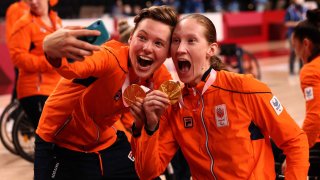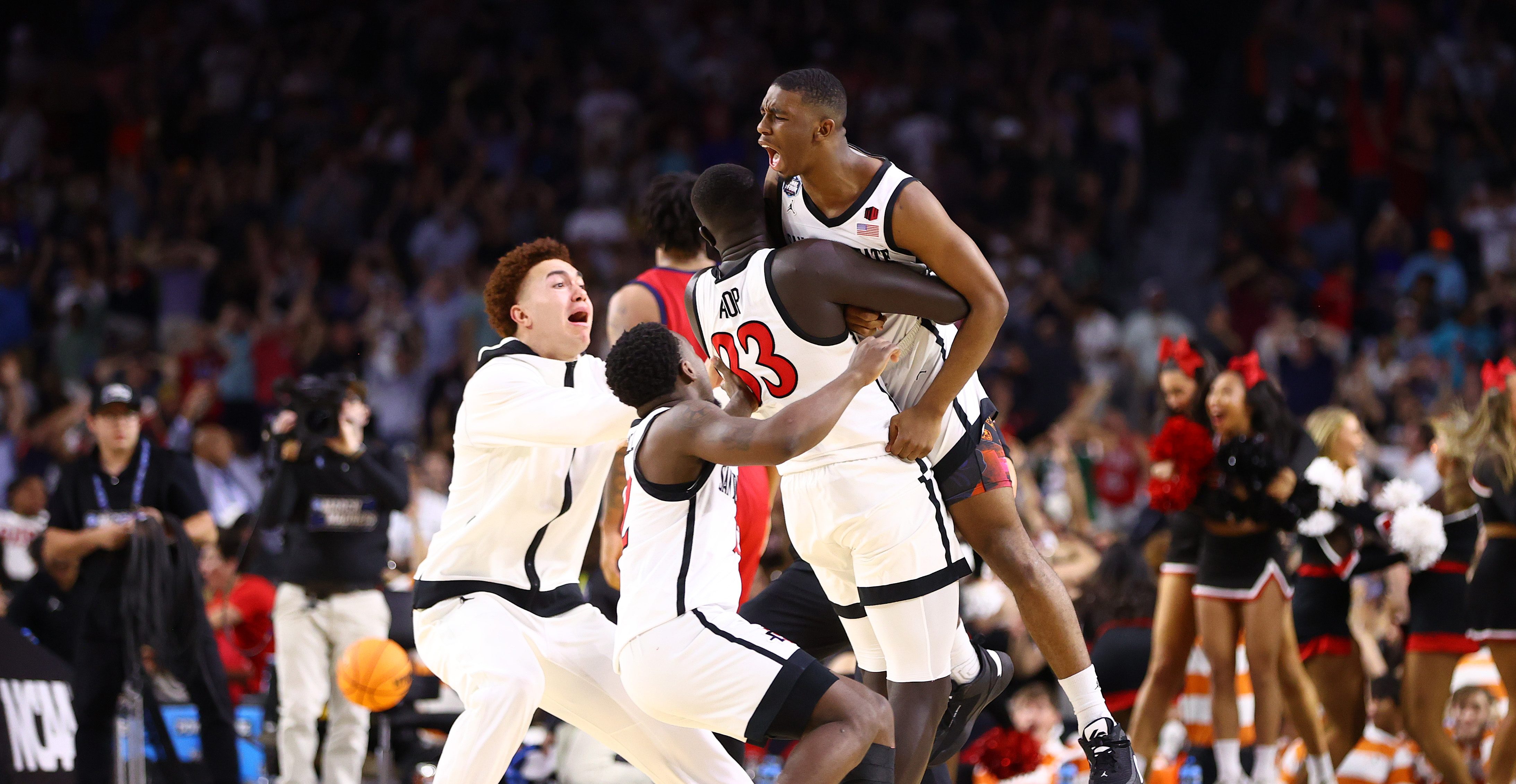
I am going to die.
That's the first thought gold medal-winning Paralympian Bo Kramer had when she was diagnosed with a rare form of bone cancer at age 11.
The Netherlands native never succumbed to what doctors labeled Adamantinoma -- instead, she used the diagnosis to propel her dreams forward from aspiring footballer to gold-medal wielding wheelchair basketball star.
When Kramer was a child, she experienced a knee injury which prompted X-rays. “They found a lot of white spots on my right tibia,” she said. But that's not what they were looking for.
Get San Diego local news, weather forecasts, sports and lifestyle stories to your inbox. Sign up for NBC San Diego newsletters.
In the absence of her soccer dreams, a desire crystalized to chase competition in a new form.
“I was born with a positive mindset, and this definitely helped me,” said Kramer. “This was for sure the first time in my life I faced adversity.”
The Dutch athlete knew the journey would be hard, but hope was never something she lacked. “I was just young enough to not see the problems for the longer term, so I wasn’t afraid for the future,” she confidently disclosed.
SportsWrap
The top sports headlines of the day
But how would Kramer go from being diagnosed with a rare bone cancer triggering aggressive tumors to an athlete capable of taking home Paralympic hardware?
Diagnosed at 11 years old with a one-in-a-million form of cancer
Kramer was born in Almere, about 12 miles outside Amsterdam, and lived there with her mother, father, twin sister and two dogs when she received the call.
“They found out I had bone cancer, but a very rare one. It’s called ‘Adamantinoma’ and I was the first child on earth who was diagnosed with this one,” said Kramer.
Adamantinomas are slow-growing cancerous bone tumors that usually appear in the tibia, jaw, forearm, hands or feet.
Her right tibia was covered in tumors and since she was not fully grown yet, chemotherapy wasn’t a suggested option. All Kramer needed was an operation – but that meant removing most of her leg before even becoming a teenager.
Doctors replaced Kramer’s right tibia with her left fibula.
“I was the donor of my own bone,” she said. “This was a heavy operation. I wasn’t able to walk for more than six months and the total rehabilitation process took more than one year.”
The cancer came back twice. Between 2010 and 2014, she underwent nine operations in total to remove all the cancer and every operation made Kramer weaker and weaker to a point where walking, running and jumping inflicted unbearable pain. Now the athlete manages to walk without a wheelchair, but when she laces up her basketball sneakers to take on the court, she needs the chair for support.
She has been cancer free since 2020.
Falling in love with a new sport
Wheelchair basketball wasn’t always the plan.
Kramer’s dreams always revolved around soccer, but when cancer threw a wrench in her plan, her realities changed. She couldn’t push her body to the same limits that she was used to, but she could if she had the assistance of a wheelchair. Hence, the birth of her love for wheelchair basketball.
“At one point, I found out I wasn’t able to play football anymore and my dream kind of crashed,” she said. “I really think that was the hardest part of ‘being sick.’”
“I spoke a lot about this with my parents and together we tried out all different kinds of sports. One day it was wheelchair basketball, and that was love at first sight.”
Kramer tried the sport in 2013, and from there, she was determined to continue. She began her wheelchair basketball journey training for the Netherlands’ national U-18 team.
“The fact I found my new love in this sport really helped me in my rehabilitation and the acceptance of the fact that I wasn’t able to play able-bodied sports anymore.”
Before the transition to basketball, Kramer immersed herself in football, all with the intention of making AFC Ajax Vrouwen, the top women’s league in the Netherlands. But once her walking became limited and her love for basketball grew, Kramer was not going to waste any time before taking things to the next level. She didn’t just start playing for fun – she went right into competition, making appearances at multiple World and Paralympic Championships.
The Netherlands women’s national team, which Kramer is proudly part of, currently holds the title of Olympic champion after winning the gold medal at the 2020 Tokyo Games. The team clinched an easy victory over China in the final, where Kramer stood as the top scorer with 15 points.
The trophy case doesn’t just have one medal though.
Kramer holds two World Championship medals (bronze in 2014, gold in 2018), four European Championship medals (silver in 2015, gold in 2017, gold in 2019, gold in 2021) and two Paralympic medals (bronze in Rio 2016, gold in Tokyo 2020).
Leveraging social media for good
Kramer, who currently trains daily while also completing her first year of her master’s in Biomedical Sciences, tries to divvy up her time wisely. One of her favorite things to do when she is off the court or out of the classroom is to engage with her followers.
“I love to share with the world what’s going on in my life since it’s not the ordinary life everyone lives,” she said. “I like to spread the fact that I play wheelchair basketball to get more people familiar with it and hope that the sport will get bigger and bigger.”
Kramer not only shares her love and support for the niche sport she plays professionally, but also to highlight her own sexuality and desire for inclusion.
Kramer commented to the Paralympics on her path to self-acceptance:
“Stepping into the Paralympic sports world nine years ago was a big step for me. From day one it felt like this warm and lovely bath. Everyone is sweet, everyone has their own story, everyone looks different or has a different handicap, but everyone is welcome, and you can be your true self.”
Kramer, who identifies as part of the LGBTQ+ community, feels heard as a Paralympian, especially through social media. She primarily turns to Instagram when she wants a dose of social media but has recently dabbled in TikTok as well.
“I hope people see me as a really hard-working woman who knows what she wants. A positive mindset is something that I love, so I’m always trying to show the world I have one,” Kramer said.
It’s about drive and it’s about determination.
“If you have a dream, please have the confidence in yourself that you can achieve it,” added Kramer. “No matter what other people say, no matter what other people think. If you have a dream, only YOU can achieve it.”



